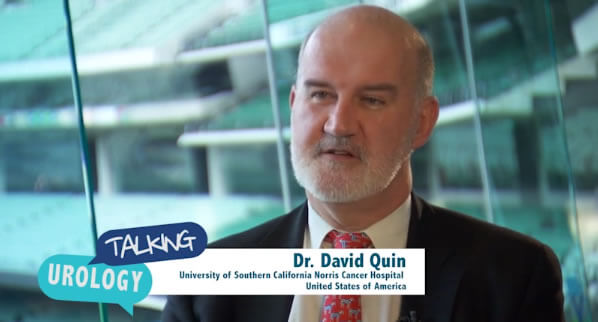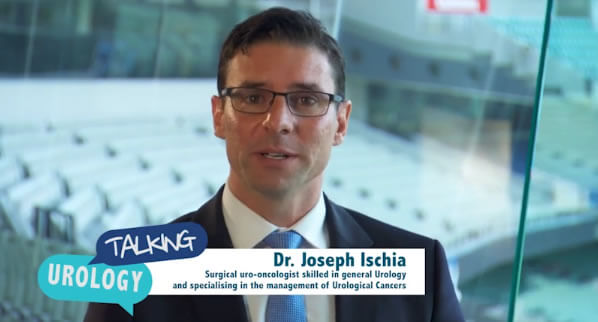ANZUP 2018 – Dr Ben Tran
Dr Carmel Pezaro talks with Dr Ben Tran about ‘Bringing Data Back’. He’s sexy. He’s funny. You’ll love him
Talking Urology Podcast Transcript
ANZUP 2018 Interviews – Ben Tran
Carmel Pizzaro: Hey, Ben. Thank you for agreeing to do this. Can you tell us a bit more about how you’re going to bring data back?
Ben Tran: Thanks Carmel, it’s great to be here and have a chat to you about data. As you know, I love data and I think data is so important in today’s research world. A lot of our colleagues might think registries and collecting data might be a little bit boring, but data is really necessary not only to describe what we actually do in clinical practice but to help facilitate translational research as well as what I think is the cutting edge in clinical research which is generate a platform for registry-based randomized controlled trials.
Carmel: So, we are going to get in to registry-based trials but before we do, I think some of our colleagues and peers may feel that one of the challenges with using data is that it is more work to collect it. So, what would you say, how much is involved in collecting this kind of data?
Ben: That’s a great question and it all depends on what you wanted to do with the data in order to generate a data set that is feasible and easy for clinicians to collect. So, a lot of the registries out there collect a lot of detail and that is very difficult for clinicians to find time to do that and what you find is that amongst all that detail very little is used for research or other purposes. So, when we are designing a registry or a database, a lot of care for consideration is taken into deciding which fields are absolutely necessary, which fields might be nice to have and which fields are not necessary at all. So, when we generate databases, we have to test it through the multiple clinicians to ensure that it is really just the essential pieces that are needed. And so, all within the groups that we work with, we find that the time and effort required to collect data is very minimal, and in fact we have created databases that help people in their clinical practice as well. So, when you pull up a patient on the database, for instance, you have a brief summary of where the patient is at automatically, so that might help you in your actual clinical practice.
Carmel: So, you mentioned in your excellent talk yesterday that using data might be different to just asking clinicians what their practice is. Can you explain why that might be?
Ben: So, what we have published a couple of years back was a study using a colorectal registry. We interviewed clinicians who were contributing data to the registry and we surveyed them actually and we asked them what their clinical practice was, perhaps what chemotherapy they used and how often they might use it, and then we looked at their actual clinical data using the registry, and we found there was zero correlation between what they thought they did and what they actually did do. And if you think back to your practice, what you remember are really the outstanding responses or the extremes of your clinical practice as opposed to what you do day-to-day. So, there was a real disconnect between what we recollect and what we actually do. So, we find that if you really want to understand clinical practice in the real world, you need to collect the data as opposed to interviewing clinicians about what they think they do.
Carmel: Yes, fascinating. So, let’s get on to this area of registry-based trials. Talk us through how one might run a registry-based trial perhaps using an example in uro-oncology.
Ben: Great. So, just before I get there though I just want to explain why registry-based trials are the future of clinical research. We all know trials are very, very expensive and because of that, they are dominated by pharma-sponsored studies, and pharma have their own interest and they might not want to do studies comparing two known standard of cares or as we as academics might have a really interest in figuring out which treatment, treatment A or treatment B, is better than the other. And those studies need to be done by cooperative groups, but as you know it’s very, very difficult to get a grant funding to fund these sorts of studies these days. And so, with the registry, if you’re already collecting the clinical data that is ready for use for clinical trials. And so, you could use a one registry to as the basis for 10 or 20 or 30 clinical trials that are randomized. So, the way we envision it and the way we are doing it at the moment is enrolling or in recruiting sites that are already entering data into our registries and then building in a randomization tool. So, patients who were seen in clinic and about to start, let’s say, we are doing a trial comparing Abiraterone to Enzalutamide for instance, let’s just say we are doing that study, you have a patient you are seeing, you want to start them on one or the other and you know that there’s a trial running on your site using the registry, so you’d consent them first, if they consented to being part of the study you’d randomize them using a randomization tool and then it would spit out which treatment that they are randomized to and then you’d go out and prescribe that as you normally would and go on to collect the clinical data as you normally would within the registry as well. And at the end of the study, you compare the end points. Your patients are randomized to treatment A versus treatment B.
Carmel: So, let’s talk about end points, what kind of end-points are associated to registry-based trials?
Ben: The way I like to describe them they’ve got to be hard end-points, really black or white kind of scenarios. So, overall survival, death or being alive is the clear end-point that you can measure on a registry-based trials. End-points that are more difficult are progression-free survival because as clinicians in our own practice, we have different reasons for stopping treatment. It’s not really clearly defined as it might be within a kind of normal randomized controlled trial. Toxicity is also really difficult unlike prospectively run randomized controlled trials where the toxicity is graded, they are using CTCAE criteria, in our clinical practice we might not grade that as accurately. So, if you’re sticking to hard end-points along survival then you can figure out the answer to your question.
Carmel: Yes, fantastic. So, Ben you are very active in the space. People might be hearing that’s thinking, “Well that sounds like something I’m really interested in being part of,” are there opportunities to contribute to the databases that you are involved with in GU and how can people get involved?
Ben: We are always interested in having more sites on board for our databases. All you need to do is send me a line or give us a call and we can always figure out how we might be able to get your site on board.
Carmel: Great. And just to clarify, what are your current database areas in GU?
Ben: So, we have a castration-resistant prostate cancer database called ePAD and we will soon be releasing iTestis which is a testicular cancer registry and soon to come hopefully later this year will be a metastatic bladder cancer database called BLADDA and also a kidney cancer registry called KRAB.
Carmel: Covering the field, fantastic. Nice to talk to you, Ben.
Ben: Thanks, Carmel.












